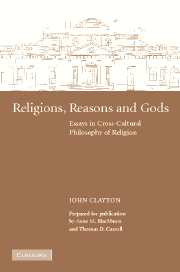Book contents
- Frontmatter
- Contents
- Editorial preface
- Acknowledgments
- List of abbreviations
- 1 Claims, contexts and contestability
- PART I REASON AND RELIGIOUS PLURALISM
- PART II THEISTIC ARGUMENTS IN PRE-MODERN CONTEXTS
- PART III THEISTIC ARGUMENTS IN EARLY-MODERN CONTEXTS
- Appendix: The 1997 Hulsean Sermon
- Bibliography
- Index
PART I - REASON AND RELIGIOUS PLURALISM
Published online by Cambridge University Press: 22 September 2009
- Frontmatter
- Contents
- Editorial preface
- Acknowledgments
- List of abbreviations
- 1 Claims, contexts and contestability
- PART I REASON AND RELIGIOUS PLURALISM
- PART II THEISTIC ARGUMENTS IN PRE-MODERN CONTEXTS
- PART III THEISTIC ARGUMENTS IN EARLY-MODERN CONTEXTS
- Appendix: The 1997 Hulsean Sermon
- Bibliography
- Index
Summary
The introductory chapter, ‘Claims, Contexts and Contestability’, ends by suggesting that studying the pre-modern history of theistic proofs may support investigation of the selective and collective instrumentality of argument. Clayton indicates a variety of ways in which theistic proofs may function within intra-traditional, as well as inter-traditional, contexts. This discussion reveals his particular interest in the ways in which intra-traditional uses of theistic proofs may enhance ‘group solidarity’. Moreover, examining this role of the proofs in pre-modern contexts may render it more easily visible at work in modern contexts.
Such remarks provide a crucial frame for the chapters that follow in Part I. Chapter 2, ‘Thomas Jefferson and the Study of Religion’, proceeds on several fronts. Against the view that ‘natural religion’ provides a universal discourse suited to the management of pluralism by virtue of its supra-traditional character, Clayton presents one account of its origins, emphasizing the Protestant Christian character of this ‘universal’ language of religion. He also notes the limited character of difference required to be managed by such language in Jefferson's day. Jeffersonian America's religious parochialism is juxtaposed with the greater religious pluralism of contemporary Britain and America. Here Clayton argues that the disciplinary language of philosophy of religion retains the parochial character of its origins in natural religion discourse and is thus limited in its capacity to communicate among diverse religious communities.
- Type
- Chapter
- Information
- Religions, Reasons and GodsEssays in Cross-cultural Philosophy of Religion, pp. 13 - 15Publisher: Cambridge University PressPrint publication year: 2006



